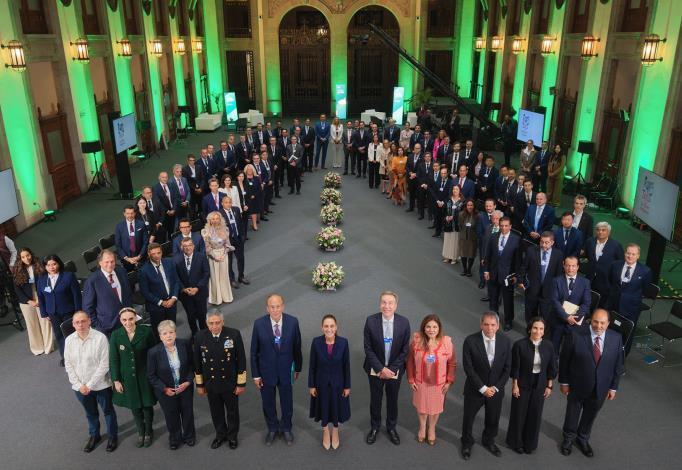






October 10th, 2025








October 10th, 2025
Mexico’s proposed tariff reform under the Ley de los Impuestos Generales de Importación y de Exportación (LIGIE) remains under congressional review, as President Sheinbaum’s administration holds discussions with China and other Asian nations before final approval. The proposal, introduced in early September 2025, seeks to raise tariffs by up to 50% on nearly 1,500 products, including vehicles, textiles, plastics, and steel, targeting imports from countries without trade agreements with Mexico, such as China, India, and South Korea. While the reform aims to protect domestic industries and align with U.S. efforts to curb Chinese trade influence, it has sparked concern among legislators and trade partners China, Mexico’s second largest trading partner, warned that the measure could damage investor confidence and bilateral relations As a result, Mexico’s Congress, led by the Morena majority, has paused the initiative until late November to consider potential modifications. Any adjustments could reduce the projected $3.76 billion in tariff revenue but may also ease tensions with China and open the door for a more balanced approach, potentially supporting trilateral cooperation between Mexico, the U.S., and Canada on coordinated tariff strategies
Source: REUTERS

Following recent following recent remarks by Donald Trump suggesting the possibility of replacing the USMCA with separate bilateral trade agreements, Mexican President Claudia Sheinbaum emphasized the best path forward remains a unified North American trade agreement Jamieson Greer, U S Trade Representative, stated that there will be no negotiations to extend or renew the agreement unless Mexico complies with provisions on energy, telecommunications, agriculture, and other areas Although political rhetoric may intensify in the lead-up to the 2026 review of the treaty, the economic interdependence of the U.S., Mexico, and Canada makes full disintegration of the USMCA unlikely.
Source: EL PAÍS

On Wednesday, Mexican President Claudia Sheinbaum presented “Plan México” at the World Economic Forum (WEF). She described it as a cornerstone of her administration’s development strategy to strengthen Mexico’s internal market and enhance North American cooperation Key initiatives include major public-private investments in energy and water infrastructure, along with the creation of 26 Economic Development Poles to attract private capital In response, the WEF president noted that Mexico would need to improve conditions for investment, AI, and technology in order to fulfill the promises outlined in Plan México.
Source: EL ECONOMISTA


The Mexican government remains positive about potential economic growth, President Claudia Sheinbaum and Finance Minister Edgar Amador Zamora reported a 4.6% real increase in public revenue for 2025, achieved without new taxes thanks to better tax collection and trade enforcement. They also announced new incentives for domestic investment focused on machinery, innovation, and workforce This positive news align with the announcement that The World Bank raised its 2025 growth forecast for Mexico, showing cautious optimism
Source: EL ECONOMISTA
María Corina Machado’s Nobel Peace Prize highlights global support for democratic resistance and antiauthoritarian movements, especially in Latin America Her recognition strengthens Venezuela’s opposition, offering legitimacy and protection, while showing the Nobel Committee’s independence by valuing moral courage over power, signaling renewed commitment to freedom, justice, and international democratic solidarity.
Source: AP NEWS


NORTHCAPITALFORUMHIGHLIGHTSUSMEXICO-CANADATRADESTRENGTH
During the first day of the North Capital Forum held in Mexico City, key business and government leaders from Mexico, the United States, and Canada gathered to reaffirm their commitment to the USMCA. The event served as a platform where business and government leaders engaged in open dialogue, revealing a shared understanding that, despite prevailing uncertainty, there remains strong interest among the private sector to ensure that the governments of Mexico, the United States, and Canada reach agreements that strengthen North America's regional competitiveness This made clear that the USMCA is viewed as the backbone of a shared economic vision that binds the region’s prosperity to mutual cooperation.
Source: MILENIO
The U.S. Treasury Department sanctioned 12 Mexico-based companies and eight individuals accused of supplying fentanyl precursor chemicals to the “Chapitos” faction of the Sinaloa cartel, led by sons of Joaquín "El Chapo" Guzmán The businesses operating in sectors like pharmaceuticals, chemicals, and real estate allegedly used front companies to evade previous sanctions. All U.S. assets were frozen and transactions blocked. Treasury officials described the action as part of a broader strategy, under the Trump administration, to treat drug cartels as foreign terrorist organizations and disrupt their financial networks.
Source: ABC NEWS
Initiative with Draft Decree to Amend and Add Articles 59 and 71 of the Federal Labor Law
Regarding the Establishment of a 40-Hour Workweek
• Presented by: Parliamentary Group of the Labor Party
• Objective: To establish a maximum workweek of 40 hours. Workers and employers may distribute the work hours, ensuring that daily hours do not exceed eight and weekly hours do not exceed forty.
• Status: 2025-10-07 –Published in the Parliamentary Gazette
Initiative with Draft Decree to Add a Paragraph to Article 83 of the Federal Labor Law
Regarding Salary Transparency
• Presented by: Senator Martha Lucía Mícher Camarena (LNal - MORENA)
• Objective: To require employers to state the salary range offered in all job offers or vacancy announcements, whether published internally or externally. The publication of the salary range will be mandatory from the start of recruitment until the formalization of the contract.
• Status: 2025-10-08 –Published in the Parliamentary Gazette

Minute with Draft Decree Reforming and Adding Various Provisions to the Amparo Law
• Presented by: Senate of the Republic
• Objective: It establishes that, in amparo proceedings, all motions must be made in writing. Likewise, if the parties or their representatives have a user account on the Federal Judiciary Online Services Portal, they must declare it from their first action in the amparo trial.
• Status: 2025-10.06 –Published in the Parliamentary Gazette
Initiative with a Draft Decree Issuing the General Water Law and Amending, Repealing and Adding Various Provisions of the National Water Law
• Presented by: Exective Branch
• Objective: Issues the General Water Law, and reforms the National Water Law. It aims to guarantee access to water for personal and domestic use, define responsibilities of all levels of government, promote sustainable and equitable use, creates a National Water Registry, and introduces new rules on concessions and sanctions.
• Status:2025-10-09 Published in the Parliamentary Gazette

Declaration of Publicity of the Report with Draft Decree that Amends, Adds, and Repeals Various Provisions of the Customs Law
• Presented by: Secretary of Finance and Public Credit
• Objective: Modernize the customs legal framework to strengthen tax collection, combat tax evasion, and improve the competitiveness of Mexican foreign trade. It also aims to harmonize the Customs Law with various changes, including the creation of new government agencies such as the Digital Transformation and Telecommunications Agency; the replacement of the Asset Administration and Disposal Service, the Institute to Return Stolen Goods to the People, and State productive companies with State public enterprises.
• Status: 2025-10-07 –Approved, sent to Senate
